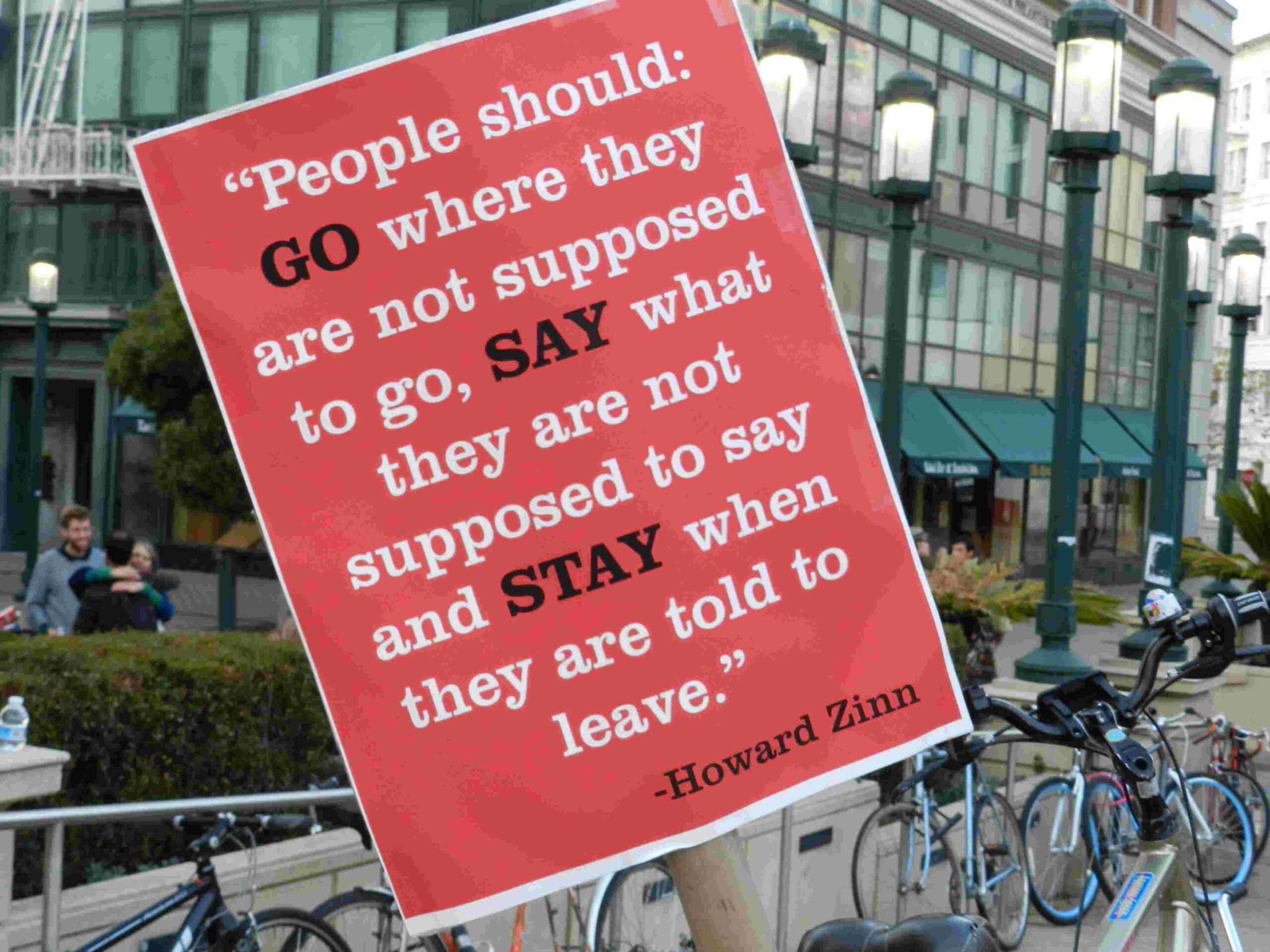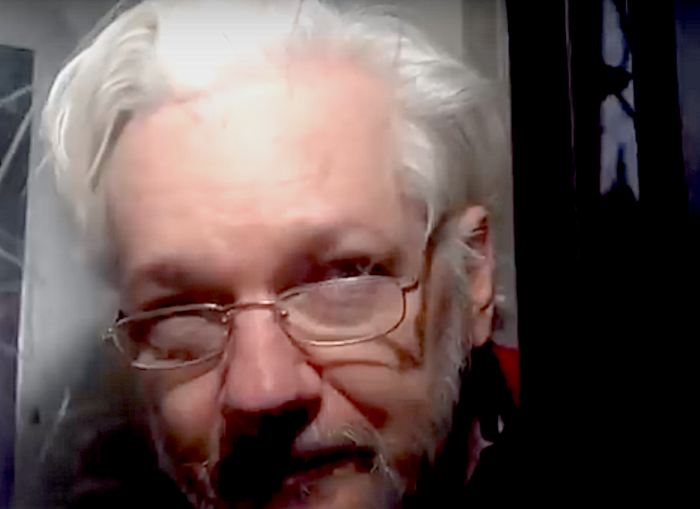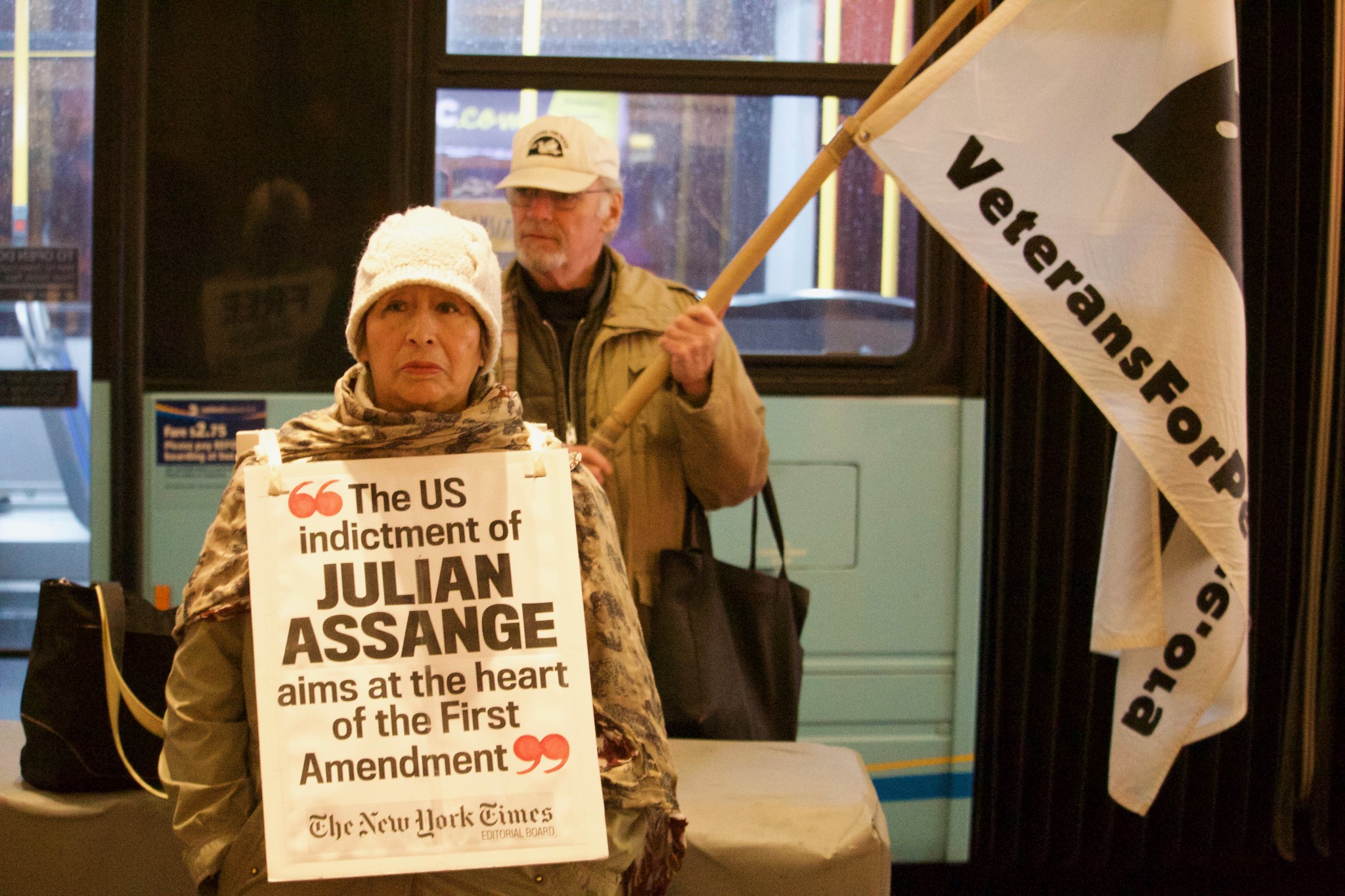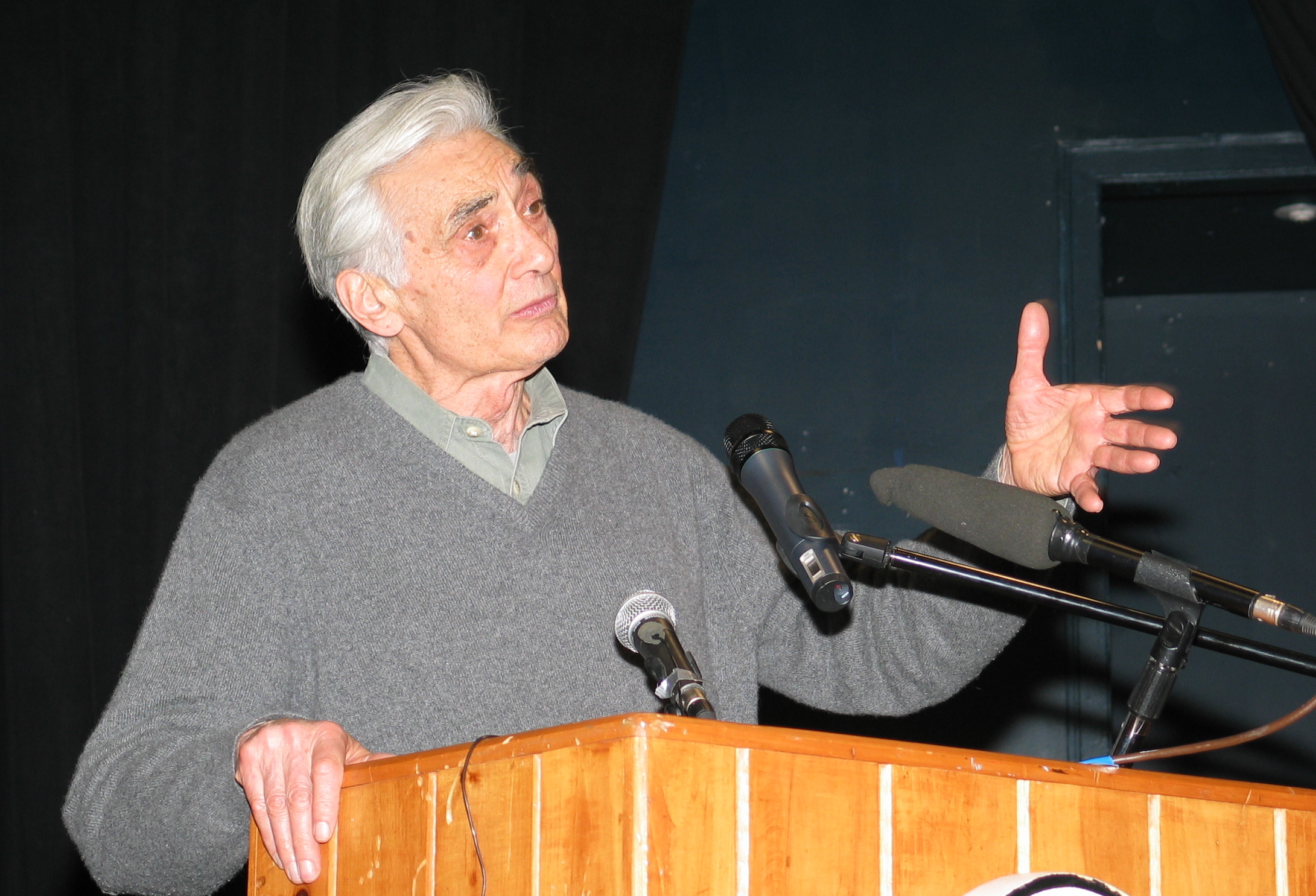This is a trial of the First Amendment as a foundation of our society and it calls for popular participation, writes Nozomi Hayase.

Sign from Occupy Oakland, November 2011. (Mercurywoodrose, CC BY-SA 3.0.)
By Nozomi Hayase
Common Dreams
 On Jan. 24, WikiLeaks founder Julian Assange, who is detained in London’s Belmarsh prison solely for the purposes of the U.S. extradition request, was moved out of solitary confinement. He is now in a wing of the prison where he can interact with other inmates.
On Jan. 24, WikiLeaks founder Julian Assange, who is detained in London’s Belmarsh prison solely for the purposes of the U.S. extradition request, was moved out of solitary confinement. He is now in a wing of the prison where he can interact with other inmates.
In a statement, WikiLeaks Ambassador Joseph Farrell said, “The move is a huge victory for Assange’s legal team and for campaigners who have been insisting for weeks that the prison authorities must end the punitive treatment of Assange.”
Assange has been charged with 17 counts of espionage related to WikiLeaks’ 2010-11 publications concerning U.S. wars in Iraq and Afghanistan, which revealed embarrassing U.S. diplomatic details and torture in the Guantanamo Bay Prison.
He now faces 175 years in prison in the U.S., where former CIA officer John Kiriakou pointed out that he would receive no fair trial. Also, the evidence that has been submitted to the U.S. prosecution at his last hearing indicates that the U.S. government will not apply First Amendment protection to a foreign journalist such as Assange, and that he would be placed under Special Administrative Measures (SAM) if he is extradited.
That would gag him and his attorneys from making public statements about the case, leaving the government to leak its side of the story. It would also put Assange and his lawyers in separate cells with a grill between them, making eye contact and the sharing of documents impossible. While the SAM rules prohibit the government from eavesdropping on privileged attorney-client discussions, most lawyers with clients under SAM assume they are being listened in to.

Juilan Assange leaving London court in a police van, Jan. 13, 2020. (Ruptly video screenshot)
For those who are willing to look closely, it is clear that Assange’s U.S. extradition case is politically motivated. In May 2019, Nils Melzer, the United Nations special rapporteur on torture, called out Western governments’ abuse of power:
“In 20 years of working with war victims, violence and political persecution, I have never seen a group of democratic states unite to deliberately isolate, demonize and abuse a single individual for so long a time and with such little respect for human dignity and status of rights. Julian Assange’s collective persecution must end here and now!”
From the Westminster Magistrates’ Court to Belmarsh prison, amidst a lack of media coverage, the injustice of the U.K. government against the WikiLeaks publisher has been allowed to continue.
The unfair treatment by the government includes the restriction of Assange’s access to legal counsel, making it hard for him to adequately prepare for his defense. The most concerning issue is the prison authorities’ treatment of Assange, subjecting him to what amounts to psychological torture, as was indicated by Melzer and medical doctors.
Assange’s Franco-Spanish lawyer Juan Branco described that these unjust proceedings are violent and is a force enough to destroy the WikiLeaks founder. So, this change in the treatment of Assange in a British super maximum-security prison was surely a major milestone towards justice.
This would not have been possible without the pressure of Assange’s legal team and the tireless efforts of individuals who take the issue of human rights violations seriously. More than 100 medical doctors have issued an open letter calling for urgent action to protect Assange’s life. Around the world, concerned citizens have been engaging in protests and rallies. Recently, a petitioning campaign initiated by Phillip Adams in Australia, has delivered a Royal Pardon request highlighting the process of psychological torture, and sent 40, 000 emails to politicians, the Belmarsh governor and London Magistrate Emma Arbuthnot.

Press freedom advocates in New York City, Dec. 26, 2019. (PamelaDrew, Flickr, CC BY-NC 2.0)
Yet, ultimately, what halted this violence came from an unexpected place. Fellow inmates inside the prison, which is used to detain murderers and those with terrorists’ offenses, revolted against the prison authorities’ mistreatment of Assange and petitioned the prison governor.
Craig Murray, the former British Ambassador to Uzbekistan, commented on this new positive development:
“A truly inspiring story. Julian is finally released from solitary in Belmarsh because the other prisoners in the prison were appalled by his treatment and took up action on his behalf. A small victory for basic humanity – and it took criminals to teach it to the British state.”

Howard Zinn speaking at Marlboro College February 2004. (Jared and Corin, CC BY-SA 2.0, Wikimedia Commons)
Zinn’s Lessons
The week following this resistance inside Belmarsh was marked by the 10th anniversary of the death of the great historian and social activist Howard Zinn. The words of the giant help us recognize the significance of the non-violent act of defiance carried out behind prison walls. Commenting on the American writer and philosopher Henry David Thoreau, who reminded us of our duty of civil disobedience, Zinn wrote:
“Thoreau’s great insight is that there is a moral emptiness in government unless it is filled by the actions of citizens on behalf of justice. That corresponds exactly to the democratic philosophy of the Declaration of Independence, in which governments have no inherent right to exist or to rule, but deserve to do so only when they fulfill the charge given them by the people: to protect everyone’s equal right to ‘life, liberty, and the pursuit of happiness.’”
The courage of prisoners to stand up for what they felt was right has now shown us the potent creative power inside history that can counter state violence. It is the conscience of fellow human beings responding to a tiny voice in the heart that called whistleblowers and journalists to risk their lives and sacrifice their personal liberty in order to uphold higher ideals.
The former U.S. military analyst and whistleblower Chelsea Manning disobeyed an unjust law to bring out the truth. Assange, through his work with WikiLeaks, provided a shield for Manning’s conscience, fiercely defending it from the forces trying to crush it, and amplifying the truth that his source wanted to set free.
Solidarity that emerged from inside a prison notorious for being the U.K.’s Guantanamo Bay became contagious. Momentum is building in Europe. Last week, the Counsel of Europe’s Parliamentary Assembly (PACE) recognized that the prosecution of Assange threatens media freedom and voted to oppose Assange’s extradition to the U.S. In a five-page resolution entitled, “Threats to media freedom and journalists’ security in Europe,” the parliamentary arm of Europe’s largest human rights body called for the immediate release of Assange:
“[Member states should] consider that the detention and criminal prosecution of Mr Julian Assange sets a dangerous precedent for journalists, and join the recommendation of the UN Special Rapporteur on Torture and Other Cruel, Inhuman or Degrading Treatment or Punishment who declared, on 1 November 2019, that Mr Assange’s extradition to the United States must be barred and that he must be promptly released.”
In Brussels, an Assange Day event was organized last week to call on the Belgian government to recognize Assange as a political prisoner and protect him. John Shipton, father of the multi-award winning journalist and 2019 Nobel Peace nominee, accepted First Academic Honoris Causa at the Palais des Académies on behalf of his son, acknowledging support coming from all over the world.
Assange’s U.S. extradition hearing is scheduled for Feb. 24-28, and will then resume on May 18 for three more weeks. The prosecution of Assange is an attack on press freedom, and its outcome will not only determine the life of Assange, but our own future.
This is a trial of the First Amendment as a foundation of our society and it calls for our participation. Only the moral courage of ordinary people willing to fulfill their duty of civil disobedience can end this travesty of injustice and free those brave among us who responded to a call of conscience—and democracy.
Nozomi Hayase, Ph.D., is an essayist and author of “WikiLeaks, the Global Fourth Estate: History Is Happening”. Follow her on Twitter: @nozomimagine
An earlier version of this article appeared on Common Dreams.
The views expressed are solely those of the author and may or may not reflect those of Consortium News.
Please Donate to Consortium News.
Before commenting please read Robert Parry’s Comment Policy. Allegations unsupported by facts, gross or misleading factual errors and ad hominem attacks, and abusive or rude language toward other commenters or our writers will not be published. If your comment does not immediately appear, please be patient as it is manually reviewed. For security reasons, please refrain from inserting links in your comments, which should not be longer than 300 words.

The UK has not just left the EU, it has left the family of civilized and elightened nations.
Now it’s up to Scotland, Wales and Ireland to show England the much deserved middle finger, without falling for any further EU claptrap, which is simply the same anti-democratic globalist bollocks as promoted by the City Of London and Wall Street.
Unless of course, the people of England finally realize that the source of all their discontent is ‘the City’ and this unbelieveably screwed up monarchy of theirs.
We, the regular people of Europe/EU, who are stuck in this neofascist farce that is ‘team nato’ – against our will and without any say whatsoever – send our love and support to our American sisters and brothers in their next brave attempt to rid themselves and the world of this insatiable, suicidal monster, that calls itself neoliberal empire, but in truth is nothing other than the Fourth Reich rising.
Be wise.
Or.. let your vassal countries all over the world participate in your frigging presidential elections!
You would certainly profit from our objectivity, promise!
I’m waiting for international public pressure from any quarter to be put on the Australian Government. Julian is an Australian citizen yet all his government has done for him is offer ‘consular assistance’ which has, obviously, done nothing to help him. Yet while Sweden, the USUK and Ecuador come in for their justifiable share of opprobrium, Julian’s own government seems to be getting a free pass.
The First Amendment to the United States Constitution places NO restrictions whatsoever regarding citizenship and in fact refers to the rights of PEOPLE, an all inclusive term.
As the article states, Julian Assange’s extradition to the United States must be barred and he must be promptly released. He must ALSO be fully compensated for injustice he has been forced to endure and what’s more, HONORED for the valuable service he has provided to Americans and all Mankind.
Any journalist who opposes Julian Assange at this late stage will have to answer to other journalists when the “authorities” come for them. They have to answer to us, too. Also, any young person should read Henry David Thoreau starting now. Great piece of work, Dr. Hayase.
The US MSM has done a fine job for the deep state. I had 30 “Free Press, Free Assange” T shirts made up. Have not been able to sell one (cannot even give them away).
Feb 3, 2020 Powerful Government, Weak Nation
This isn’t the approach of a free people. Not even close. And the founders repeatedly warned us about the dangers of “consolidation”
see: youtu.be/IkmNnNGA5s4
At last various parts and people of the world are recognising what a sham and disgrace is the British authorities denial of decency and justice to Julian Assange. What they want is total conformity and subjects like sheep.
Thanks for this guardedly heartening news! #FreeJulianAssange #FreeChelseaManning #FreethePress
Fortunately the inmates of Belmarsh Prison did not loose their human integrity. They are heros much as Julian Assange is.
“Today you have to be a hero to be able to act like a decent human being” says American Poet May Sarton.
www(dot)republik(dot)ch – Interview with Nils Melzer
I wouldn’t put too much hope on the resolution of the Council of Europe. It is a retirement dump for has been third league politicians (exception made for UK ex vice pm John Prescott) And whereas in the resolution some countries are named Turkey, the Russian federation, Malta, Hungary and Azerbaijan… the Assange part is buried under art 6.2 and no specific country (Sweden, UK) is pointed at.
None of the MSM has even dared to mention or publish the passing of this resolution. Thank you CN for another informative article on events around Julian.
Eugenie Basile wrote:
> I wouldn’t put too much hope on the resolution of the Council of Europe.
Well, although the Parliamentary Assembly’s call for Assange’s prompt release has no binding force, a possible last resort judgement by the European Court of Human Rights would have it. Both are institutions of the Council of Europe.
There is the Council of Europe, and there is the European Union. The Council of Europe has 47 member states, which are all the European countries except Belarus (for human rights concerns and death penalty), Kazakhstan (also human rights concerns), and the Vatican City (a theocracy).
The Council of Europe promotes democracy, human rights, the rule of law, and cooperation in Europe. 27 of its members are also the members of the European Union (28 before Brexit).
Brexit means UK’s exit from the the European Union, not from the Council of Europe and its European Court of Human Rights, which enforces the European Convention on Human Rights.
However, shamefully, some British conservative politicians want to also leave the European Convention on Human Rights after Brexit, in order to for example facilitate extraditions and deportations that breach human rights.
Because of this, Liberty — the UK organization protecting civil liberties and human rights since 1934 — has made the following statement:
“The ‘Withdrawal Agreement’ drawn up by the UK and the EU — and any extra treaties that are made — must require the UK to remain a member of both the Council of Europe and the European Convention on Human Rights.”
(Brexit negotiations and human rights | Liberty UK)
See also:
“it is highly likely that that the EU would insist on continued ECHR membership in almost any kind of future relationship”
(General election 2019: what are the prospects for UK human rights, and the Human Rights Act after the election? | Democratic Audit UK | 2019-11-25)